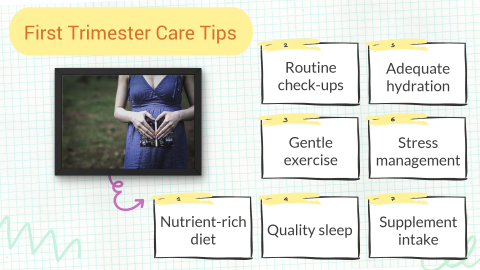Congratulations on this incredible journey! The first three months of pregnancy, often called the first trimester, are a period of rapid development for your baby and significant adjustments for your body. It can also be a time filled with questions and perhaps a little anxiety. Knowing what to expect and how to care for yourself and your growing baby is crucial for a healthy pregnancy. This guide will walk you through essential pregnancy care tips for these initial months.
Understanding the Changes Within:
During the first trimester, a whirlwind of hormonal changes takes place. These hormones are vital for supporting pregnancy, but can also lead to various physical and emotional symptoms.
Common experiences include:
Nausea and Vomiting (Morning Sickness): This can occur at any time of the day or night and is often most intense during the first few weeks.
Fatigue: Feeling unusually tired is very common as your body works hard to support the pregnancy.
Breast Tenderness and Changes: Your breasts may become swollen, tender, and more sensitive.
Frequent Urination: Hormonal changes and the growing uterus can put pressure on your bladder.
Food Cravings and Aversions: You might suddenly crave certain foods or develop a strong dislike for others.
Mood Swings: Fluctuating hormone levels can lead to emotional ups and downs.
Essential Care Tips for a Healthy First Trimester:
Confirm Your Pregnancy and Schedule Your First Appointment: As soon as you suspect you’re pregnant, take a home pregnancy test and then schedule an appointment with an obstetrician or gynecologist. This initial visit is crucial for confirming the pregnancy, estimating your due date, discussing your medical history, and planning your prenatal care.
Prioritise a Healthy Diet: Focus on consuming a balanced diet rich in fruits, vegetables, whole grains, and lean protein. Ensure you’re getting enough folic acid, either through diet (leafy greens, fortified cereals) or a supplement, as it’s vital for preventing neural tube defects in your baby. Avoid raw or undercooked meats, seafood, and eggs, as well as unpasteurized dairy products, to minimise the risk of foodborne illnesses.
Start Taking Prenatal Vitamins: Your doctor will likely prescribe a prenatal vitamin. These supplements contain essential vitamins and minerals, including folic acid, iron, and calcium, which are crucial for your baby’s development and your overall health during pregnancy. Take them as directed.
Stay Hydrated: Drink plenty of water throughout the day. Dehydration can worsen fatigue and other pregnancy symptoms. Carry a water bottle with you and sip on it regularly.
Manage Morning Sickness: While it can be challenging, try eating small, frequent meals, especially dry crackers or toast, before getting out of bed. Avoid strong smells and greasy or spicy foods. Ginger in the form of ginger ale, ginger tea, or ginger candies can also help. If nausea and vomiting are severe, consult your doctor for safe treatment options.
Get Adequate Rest: Listen to your body and get enough sleep. Fatigue is a common symptom, so don’t hesitate to take naps during the day if needed. Aim for 7-9 hours of quality sleep each night.
Avoid Harmful Substances: This is paramount. Completely avoid alcohol, smoking, and illicit drugs. Limit caffeine intake as advised by your doctor. Be cautious with over-the-counter medications and always consult your doctor before taking any new medicines.
Gentle Exercise: Engage in light to moderate exercise, such as walking, swimming, or prenatal yoga, if your doctor approves. Regular physical activity can help boost your energy levels, improve mood, and prepare your body for labour. Avoid high-impact activities or anything that could risk a fall.
Manage Stress: Find healthy ways to cope with stress, such as relaxation techniques, meditation, or spending time on hobbies you enjoy. Surround yourself with a supportive network of family and friends.
Be Aware of Warning Signs: While some discomfort is normal, be vigilant for any concerning symptoms and contact your doctor immediately if you experience severe abdominal pain or cramping, heavy vaginal bleeding, severe or persistent vomiting, fever, dizziness, or sudden swelling.
How Can Dr. Samatha Kumar Guide You Through Your First Trimester?
Navigating the early stages of pregnancy can feel overwhelming, but you don’t have to do it alone. Dr. Samatha Kumar is an experienced obstetrician and gynaecologist dedicated to providing comprehensive and personalised care throughout your pregnancy journey.
During your consultations with Dr. Kumar, you can expect:
A detailed evaluation to confirm your pregnancy and assess your individual health needs.
A tailored plan addressing your specific concerns and ensuring you receive the necessary screenings and guidance.
Practical and evidence-based strategies to alleviate morning sickness, fatigue, and other discomforts.
Guidance on maintaining a healthy diet and the importance of essential supplements.
A safe and comfortable environment to ask questions and discuss any anxieties you may have.
Vigilant monitoring for any warning signs and prompt intervention if needed.
Take the first step towards a healthy and supported pregnancy. Schedule your initial consultation with Dr. Samatha Kumar today to receive expert guidance and personalized care during your crucial first trimester. Your well-being and the healthy development of your baby are our top priorities.

